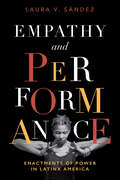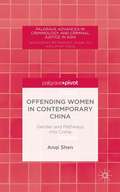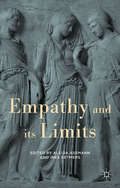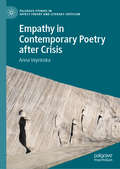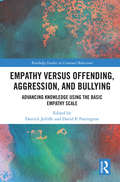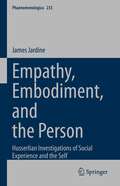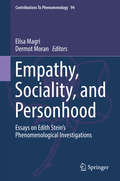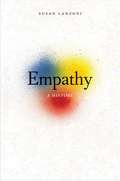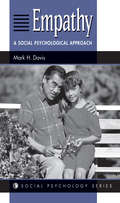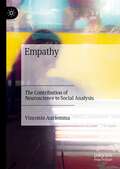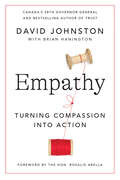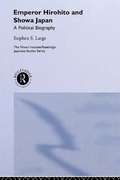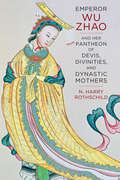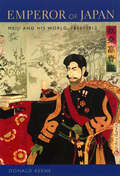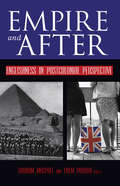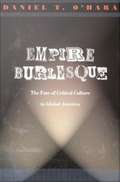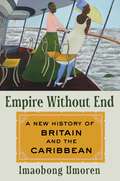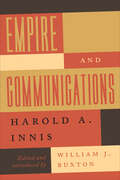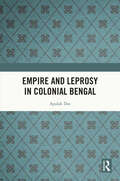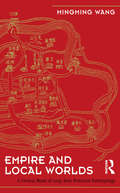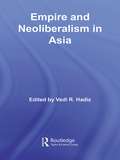- Table View
- List View
Empathy and Performance: Enactments of Power in Latinx America (Performing Latin American and Caribbean Identities)
by Laura V. SándezEmpathy and Performance advances a study of empathy and enactments of power by examining works from author-actors whose performances explore the boundaries between two kinship positions. Author Laura V. Sández studies the dramatized dilemma of cultural understanding in &“Our America,&” a notion that refers first to a collective political identity marking a common belonging in the Spanish-speaking America but also alludes to current struggles in the contemporary US. This book sees empathy as an affective response grounded in subjectivity and kinship. Sández argues that to conceptualize empathy one needs to understand how subjects organize, classify, and limit themselves, not only as agents, but also as interpreters. What sort of affiliations do these performances promote? How do they break, reinforce, or queer societal expectations about the Latinx body, the white body, or simply, the staged body? To survey different answers to these queries, Sández studies Indigurrito (Nao Bustamante); Dominicanish (Josefina Báez); ¡Bienvenidos Blancos! or Welcome White People! (Alex Torra); the apology delivered by the group Veterans Stand with Standing Rock during protests against the Dakota Access Pipeline; and Kukuli Velarde&’s body of work, from We, the Colonized Ones to A Mi Vida. In these artistic enactments, which range from 1992 to 2021, the historical construct of boundaries and bodies becomes evident. Following recent work on empathy by Lanzoni, Maibom, Calloway-Thomas, Bloom, Hogan, and Matravers, among others, Sández examines in-group/out-group divisions, the establishment of identity categories through performance, and the exploration of subaltern identities.
Empathy and Violent Video Games: Aggression and Prosocial Behavior
by Christian Happ André MelzerThrough an empirical inquiry into three categories of offending women, Offending Women in Contemporary China: Gender and Pathways into Crime explores the socioeconomic conditions that facilitate womens' pathways into crime, and examines the interplay between gender, class, rapid social changes and female law-breaking in neoliberal China.
Empathy and its Limits
by Aleida Assmann Ines DetmersThis volume extends the theoretical scope of the important concept of empathy by analysing not only the cultural contexts that foster the generating of empathy, but in focusing also on the limits of pro-social feelings and the mechanisms that lead to its blocking.
Empathy in Contemporary Poetry after Crisis (Palgrave Studies in Affect Theory and Literary Criticism)
by Anna VeprinskaThis book examines the representation of empathy in contemporary poetry after crisis, specifically poetry after the Holocaust, the September 11, 2001 terrorist attacks, and Hurricane Katrina. The text argues that, recognizing both the possibilities and dangers of empathy, the poems under consideration variously invite and refuse empathy, thus displaying what Anna Veprinska terms empathetic dissonance. Veprinska proposes that empathetic dissonance reflects the texts’ struggle with the question of the value and possibility of empathy in the face of the crises to which these texts respond. Examining poems from Charlotte Delbo, Dionne Brand, Niyi Osundare, Charles Reznikoff, Robert Fitterman, Wisława Szymborska, Cynthia Hogue, Claudia Rankine, Paul Celan, Dan Pagis, Lucille Clifton, and Katie Ford, among others, Veprinska considers empathetic dissonance through language, witnessing, and theology. Merging comparative close readings with interdisciplinary theory from philosophy, psychology, cultural theory, history and literary theory, and trauma studies, this book juxtaposes a genocide, a terrorist act, and a natural disaster amplified by racial politics and human disregard in order to consider what happens to empathy in poetry after events at the limits of empathy.
Empathy versus Offending, Aggression and Bullying: Advancing Knowledge using the Basic Empathy Scale (Routledge Studies in Criminal Behaviour)
by David P. Farrington Darrick JolliffeThis book advances knowledge about the measurement of empathy, using the Basic Empathy Scale (BES), and how empathy is related to offending, aggression, and bullying in community and incarcerated groups. Empathy is widely accepted as one of the most important individual factors that is related to offending, aggression, and bullying, and it is common in many intervention projects to aim to improve empathy in order to reduce offending, aggression, and bullying. The BES was constructed by Jolliffe and Farrington (2006) and has been widely used in a number of countries. This book presents a collection of papers exploring the application of BES in 10 different countries (England, Portugal, Spain, Poland, Italy, the Netherlands, Croatia, Australia, Canada, and the USA). Each chapter reviews the use of the BES in that particular jurisdiction, its psychometric properties, and its importance in relation to offending, aggression, and bullying. The research includes samples from primary schools, secondary schools, and the community, as well as those who are justice-involved and on probation, in prisons and secure psychiatric hospitals. In bringing together this broad range of contributions, the book concludes with wider implications for intervention, policy, and practice. This book will be valuable for students, academics, and practitioners who are interested in developing their understanding of the complex link between empathy and a range of antisocial behaviours.
Empathy, Embodiment, and the Person: Husserlian Investigations of Social Experience and the Self (Phaenomenologica #233)
by James JardineThis text explores how self-consciousness and self-understanding differ phenomenologically from the experience and comprehension of others, and the extent to which such relations are constitutively interdependent.Jardine argues that Husserl’s analyses of selfhood and intersubjectivity are animated by the question of what's at stake in recognising an agent’s engagement as the situated response of a person, rather than simply as the comportment of an animal or living body. Drawing centrally from the freshly excavated Ideas II drafts and manuscripts, the author develops Husserl’s often fragmentary investigations of attention, habit, emotion, freedom, the common world, and action, and considers their implications for subjectivity and the experience of others. Empathy, Embodiment, and the Person also brings Husserlian phenomenology into dialogue with twenty-first century philosophical concerns, from accounts of selfhood and agency from analytic philosophy to the treatment of social experience in critical theory.The book shows the reader that transcendental phenomenology can be rejuvenated by engaging with a broader philosophical landscape and will appeal to researchers, students, and instructors in the field.
Empathy, Sociality, and Personhood: Essays On Edith Stein's Phenomenological Investigations (Contributions To Phenomenology #94)
by Dermot Moran Elisa MagrìThis book explores the phenomenological investigations of Edith Stein by critically contextualising her role within the phenomenological movement and assessing her accounts of empathy, sociality, and personhood. Despite the growing interest that surrounds contemporary research on empathy, Edith Stein’s phenomenological investigations have been largely neglected due to a historical tradition that tends to consider her either as Husserl’s assistant or as a martyr. However, in her phenomenological research, Edith Stein pursued critically the relation between phenomenology and psychology, focusing on the relation between affectivity, subjectivity, and personhood. Alongside phenomenologists like Max Scheler, Kurt Stavenhagen, and Hedwig Conrad-Martius, Stein developed Husserl’s method, incorporating several original modifications that are relevant for philosophy, phenomenology, and ethics. Drawing on recent debates on empathy, emotions, and collective intentionality as well as on original inquiries and interpretations, the collection articulates and develops new perspectives regarding Edith Stein’s phenomenology. The volume includes an appraisal of Stein’s philosophical relation to Edmund Husserl and Max Scheler, and develops further the concepts of empathy, sociality, and personhood. These essays demonstrate the significance of Stein’s phenomenology for contemporary research on intentionality, emotions, and ethics. Gathering together contributions from young researchers and leading scholars in the fields of phenomenology, social ontology, and history of philosophy, this collection provides original views and critical discussions that will be of interest also for social philosophers and moral psychologists.
Empathy: A History
by Susan LanzoniA surprising, sweeping, and deeply researched history of empathy—from late-nineteenth-century German aesthetics to mirror neurons†‹Empathy: A History tells the fascinating and largely unknown story of the first appearance of “empathy” in 1908 and tracks its shifting meanings over the following century. Despite empathy’s ubiquity today, few realize that it began as a translation of Einfühlung or “in-feeling” in German psychological aesthetics that described how spectators projected their own feelings and movements into objects of art and nature. Remarkably, this early conception of empathy transformed into its opposite over the ensuing decades. Social scientists and clinical psychologists refashioned empathy to require the deliberate putting aside of one’s feelings to more accurately understand another’s. By the end of World War II, interpersonal empathy entered the mainstream, appearing in advice columns, popular radio and TV, and later in public forums on civil rights. Even as neuroscientists continue to map the brain correlates of empathy, its many dimensions still elude strict scientific description. This meticulously researched book uncovers empathy’s historical layers, offering a rich portrait of the tension between the reach of one’s own imagination and the realities of others’ experiences.
Empathy: A Social Psychological Approach
by Mark H DavisEmpathy has long been a topic of interest to psychologists, but it has been studied in a sometimes bewildering number of ways. In this volume, Mark Davis offers a thorough, evenhanded review of contemporary empathy research, especially work that has been carried out by social and personality psychologists.Davis' approach is explicitly multidimensional. He draws careful distinctions between situational and dispositional “antecedents” of empathy, cognitive and noncognitive “internal processes,” affective and nonaffective “intrapersonal outcomes,” and the “interpersonal behavioral outcomes” that follow. Davis presents a novel organizational model to help classify and interpret previous findings. This book will be of value in advanced undergraduate and graduate courses on altruism, helping, and moral development.
Empathy: The Contribution of Neuroscience to Social Analysis
by Vincenzo AuriemmaThis book examines the concept of empathy in sociological and neuroscientific discourses using innovative perspectives from sociology and social neuroscience. Through a transdisciplinary approach, the author delves into the history of empathy and its social, cultural and semantic changes, and then reviews the conception of empathy in neuroscientific discourse.Distancing itself from the traditional neuroscientific literature of biological universalism, this volume offers an innovative perspective on empathy. It also opens a new avenue for neurosociology, which is presented as the discipline that can emphasize all the cultural and emotional aspects that govern empathy. Key themes addressed in the text are: empathy in all its meanings, from Hume to TenHouten; neurosociology as one possible avenue for embracing the cultural and neuroscientific aspects of empathy; and empirical research. A valuable resource for sociology students and academics in the field of empathy and neurosociology, this book is also of interest to those studying sociological thought, and social neuroscience.
Empathy: Turning Compassion into Action
by David JohnstonThe 28th Governor General's most personal and timely book to date: a passionate and practical guide for turning empathy into action.As the world stumbles through the most severe pandemic of the last century, threatened by teetering economies, torn by political division, separated by unequal access to resources, and wrestling with issues as diverse as racism, gender, cybercrime, and climate change, the nations that best adapt and prosper are those in which empathy is fully alive and widely active. Written for a post-pandemic world, Empathy is a book about learning to be empathetic and then turning that empathy into action. Based on the personal experiences of author David Johnston, the book explores how awakening to the transformative power of listening and caring permanently changes individuals, families, communities, and nations. A how-to manual for a world craving kindness, Empathy offers proof of the inherent goodness of people, and shows how exercising the instinct for kindness creates societies that are both smart and caring. Through poignant stories and crisp observations, David contends that &“Everyone has power over some things that other people don&’t. When they learn ways to turn that power into action, they change the future dramatically.&” With clear and practical focus, Empathy looks at a host of issues that demand our attention, from education and immigration, to healthcare, the law, policing, business ethics, and criminal justice. In each of these areas, Johnston highlights the deeper understandings that have arisen during the COVID-19 crisis, with sharp emphasis on the positive and negative lessons now in crisp focus. Convinced that empathy is the fastest route to peace and progress in all their forms, David ends each short chapter with a set of practical steps the reader can take to make the world better, one deliberate action at a time.
Empatía terapéutica: La compasión del sanador herido
by José Carlos Bermejo Higuera<P>Pocos conceptos se han socializado tan velozmente en contextos en los que se habla de relaciones de ayuda, counselling, inteligencia emocional, comportamiento prosocial, relaciones humanas y humanizadoras, etc., como el de empatía. <P>Sin embargo, junto con la socialización del concepto, se ha producido también una inflación o vulgarización del mismo. O, si se prefiere, se está convirtiendo en un concepto polisémico y en evolución y, por lo mismo, necesitado de más de una clarificación. <P>Toca ya poner calificativos a la empatía, toca relacionarla con la genuina compasión, con el manejo de la vulnerabilidad del propio ayudante que, a la vez de ser sanador, está él también herido. <P>En el Centro de humanización de la Salud, particularmente en el master en counselling presentamos la empatía terapéutica como esa variable de las relaciones que contribuye a aumentar la competencia relacional, emocional, ética, espiritual y cultural de profesionales que trabajan con personas y que hacen de la relación una herramienta terapéutica, junto con la competencia técnica de la profesión que ya tienen. <P>José Carlos Bermejo HigueraReligioso camilo, doctor en teología pastoral sanitaria y máster en bioética y counselling, es profesor en la Universidad Ramón Lull de Barcelona, en la Católica de Portugal y en el Camillianum de Roma. Ha publicado cerca de cuarenta libros relacionados con la humanización. Dirige el Centro San Camilo en Tres Cantos -Madrid- (www.humanizar.es), Centro de Humanización de la Salud y Centro Asistencial para mayores y cuidados paliativos, y es director de varios posgrados sobre counselling, duelo, gestión, etc.
Emperor Hirohito and Showa Japan: A Political Biography (Nissan Institute/Routledge Japanese Studies)
by Stephen LargeEmperor Hirohito reigned for more than sixty years, yet we know little about him or the part he really played in the turbulent history of Showa Japan.Stephen Large draws on a wide range of Japanese and Western sources in his study of Emperor Hirohito's political role in Showa Japan (1926-89). This analysis focuses on key events in his career such as the extent to which he bore responsibility for Japanese aggression in the Pacific in 1941, and explains why Hirohito remains such a contested symbol in Japanese post war politics.
Emperor Wu Zhao and Her Pantheon of Devis, Divinities, and Dynastic Mothers
by Norman H. RothschildWu Zhao (624--705), better known as Wu Zetian or Empress Wu, is the only woman to have ruled China over the course of its 5,000-year history. How did she rise to power, and why was she never overthrown? Exploring a mystery that has confounded scholars for centuries, this multifaceted history suggests that Wu Zhao drew on China's rich pantheon of female divinities and eminent women to aid in her reign.Wu Zhao could not obtain political authority through conventional channels, but she could afford to ignore norms and tradition. Deploying language, symbol, and ideology, she harnessed the cultural resonance, maternal force, divine energy, and historical weight of Buddhist devis, Confucian exemplars, Daoist immortals, and mythic goddesses, establishing legitimacy within and beyond the confines of Confucian ideology. Tapping into deep, powerful subterranean reservoirs of female power, Wu Zhao built a pantheon of female divinities carefully calibrated to meet her needs at court. Her pageant was promoted in scripted rhetoric, reinforced through poetry, celebrated in theatrical productions, and inscribed on steles. Rendered with deft political acumen and aesthetic flair, these affiliations significantly enhanced Wu Zhao's authority and cast her as the human vessel through which the pantheon's divine energy flowed. Her strategy is a model of political brilliance and proof that medieval Chinese women enjoyed a more complex social status than previously known.
Emperor Wu Zhao and Her Pantheon of Devis, Divinities, and Dynastic Mothers (The Sheng Yen Series in Chinese Buddhist Studies)
by N. Harry RothschildWu Zhao (624–705), better known as Wu Zetian or Empress Wu, is the only woman to have ruled China as emperor over the course of its 5,000-year history. How did she—in a predominantly patriarchal and androcentric society—ascend the dragon throne? Exploring a mystery that has confounded scholars for centuries, this multifaceted history suggests that China's rich pantheon of female divinities and eminent women played an integral part in the construction of Wu Zhao's sovereignty. Wu Zhao deftly deployed language, symbol, and ideology to harness the cultural resonance, maternal force, divine energy, and historical weight of Buddhist devis, Confucian exemplars, Daoist immortals, and mythic goddesses, establishing legitimacy within and beyond the confines of Confucian ideology. Tapping into powerful subterranean reservoirs of female power, Wu Zhao built a pantheon of female divinities carefully calibrated to meet her needs at court. Her pageant was promoted in scripted rhetoric, reinforced through poetry, celebrated in theatrical productions, and inscribed on steles. Rendered with deft political acumen and aesthetic flair, these affiliations significantly enhanced Wu Zhao's authority and cast her as the human vessel through which the pantheon's divine energy flowed. Her strategy is a model of political brilliance and proof that medieval Chinese women enjoyed a more complex social status than previously known.
Emperor of Japan: Meiji and His World, 1852-1912
by Donald KeeneWhen Emperor Meiji began his rule, in 1867, Japan was a splintered empire, dominated by the shogun and the daimyos, who ruled over the country's more than 250 decentralized domains and who were, in the main, cut off from the outside world, staunchly antiforeign, and committed to the traditions of the past. Before long, the shogun surrendered to the emperor, a new constitution was adopted, and Japan emerged as a modern, industrialized state. Despite the length of his reign, little has been written about the strangely obscured figure of Meiji himself, the first emperor ever to meet a European. Most historians discuss the period that takes his name while barely mentioning the man, assuming that he had no real involvement in affairs of state. Even Japanese who believe Meiji to have been their nation's greatest ruler may have trouble recalling a single personal accomplishment that might account for such a glorious reputation. Renowned Japan scholar Donald Keene sifts the available evidence to present a rich portrait not only of Meiji but also of rapid and sometimes violent change during this pivotal period in Japan's history. In this vivid and engrossing biography, we move with the emperor through his early, traditional education; join in the formal processions that acquainted the young emperor with his country and its people; observe his behavior in court, his marriage, and his relationships with various consorts; and follow his maturation into a "Confucian" sovereign dedicated to simplicity, frugality, and hard work. Later, during Japan's wars with China and Russia, we witness Meiji's struggle to reconcile his personal commitment to peace and his nation's increasingly militarized experience of modernization. Emperor of Japan conveys in sparkling prose the complexity of the man and offers an unrivaled portrait of Japan in a period of unique interest.
Empire And After
by Prem Poddar Graham MacpheeThe growing debate over British national identity, and the place of "Englishness" within it, raises crucial questions about multiculturalism, postimperial culture and identity, and the past and future histories of globalization. However, discussions of Englishness have too often been limited by insular conceptions of national literature, culture, and history, which serve to erase or marginalize the colonial and postcolonial locations in which British national identity has been articulated. This volume breaks new ground by drawing together a range of disciplinary approaches in order to resituate the relationship between British national identity and Englishness within a global framework. Ranging from the literature and history of empire to analyses of contemporary culture, postcolonial writing, political rhetoric, and postimperial memory after 9/11, this collection demonstrates that far from being parochial or self-involved, the question of Englishness offers an important avenue for thinking about the politics of national identity in our postcolonial and globalized world.
Empire Burlesque: The Fate of Critical Culture in Global America
by Daniel T. O'HaraEmpire Burlesque traces the emergence of the contemporary global context within which American critical identity is formed. Daniel T. O'Hara argues that globalization has had a markedly negative impact on American cultural criticism, circumscribing both its material and imaginative potential, reducing much of it to absurdity. By highlighting the spectacle of its own self-parody, O'Hara aims to shock U. S. cultural criticism back into a sense of ethical responsibility. Empire Burlesque presents several interrelated analyses through readings of a range of writers and cultural figures including Henry James, Freud, Said, De Man, Derrida, and Cordwainer Smith (an academic, spy, and classic 1950s and 1960s science fiction writer). It describes the debilitating effects of globalization on the university in general and the field of literary studies in particular, it critiques literary studies' embrace of globalization theory in the name of a blind and vacant modernization, and it meditates on the ways critical reading and writing can facilitate an imaginative alternative to institutionalized practices of modernization. Drawing on Lacanian psychoanalytical theory, it diagnoses contemporary American Studies as typically driven by the mindless abjection and transference of professional identities. A provocative commentary on contemporary cultural criticism, Empire Burlesque will inform debates on the American university across the humanities, particularly among those in literary criticism, cultural studies, and American studies.
Empire Without End: A New History of Britain and the Caribbean
by Imaobong UmorenA powerful, groundbreaking new history of Britain and the Caribbean, challenging existing thinking about British colonization and recontextualizing the twin stories of contemporary inequality in both regions.In Empire Without End, historian Imaobong Umoren delivers an incisive and captivating exploration of the deep, complex ties between Britain and the Caribbean—largely underexamined until now. Spanning from the 16th century to the present, this riveting narrative redefines how we view the Caribbean—not just as a source of labor and resources for the British Empire, but as a dynamic testing ground for social and cultural experimentation. Umoren uncovers how the Caribbean shaped British societal ideals, many of which were exported back to Britain, laying the foundation for a racial-caste system that still affects social, political, and economic life today. This deeply researched work goes beyond historical accounts of sugar plantations and slavery. Umoren dives deeper, exploring how religion, global migration, war, grassroots protest, and even tourism all played into the Caribbean&’s lasting legacy. She boldly connects the dots to modern-day issues, arguing that the shadow of British colonization lingers through neo-colonialism, continuing to shape the lives of Caribbean people. As the world confronts a collective racial reckoning, Empire Without End sheds light on the ongoing fight for reparations and justice, offering a much-needed lens on history&’s unfinished business. Written with clarity and packed with profound insights, Empire Without End is a must-read for anyone curious about the intertwined histories of Britain, the Caribbean, and America. Joining the ranks of acclaimed historical titles like Black Ghosts of Empire and works by Ta-Nehisi Coates, this book provides a fresh, urgent perspective on empire&’s enduring impact and the global conversation it demands today.
Empire and Communications
by Harold A. InnisOriginally published in 1950, Harold A. Innis’s Empire and Communications is considered to be one of the classic works in media studies, yet its origins have received little attention. Ambitious in its scope, the book spans five millennia, tracing a path of development around the globe from 2900 BCE to the twentieth century and revealing the cyclical interplay between communications and power structures across space and time. In this new edition, William J. Buxton pays close attention to handwritten glosses that Innis added to a copy of the original edition and the revisions undertaken by his widow, Mary Q. Innis. A new introduction provides a detailed account of how the book emerged from lectures that Innis delivered at Oxford University in 1948, as well as how it related to other presentations Innis made in Britain during the same period. It explores how Innis sought to enrich his analysis by incorporating material related to phenomena such as war, education, religion, culture, geography, and finance. An insightful foreword by Marshall McLuhan is included, as well as bibliographical references and a revised index. By providing a narrative based on extensive notes from Innis, this edition makes Empire and Communications more accessible and contributes to the broad efforts to shape Innis’s legacy.
Empire and Leprosy in Colonial Bengal
by Apalak DasLeprosy, widely mentioned in different religious texts and ancient scriptures, is the oldest scourge of humankind. Cases of leprosy continue to be found across the world as the most crucial health problem, especially in India and Brazil. There are a few maladies that eventually turn into social disquiets, and leprosy is undoubtedly one of them. This book traces the dynamics of the interface between colonial policy on leprosy and religion, science and society in Bengal from the mid-nineteenth to the first half of the twentieth centuries. It explores how the idea of ‘degeneration’ and the ‘desolates’ shaped the colonial legality of segregating ‘lepers’ in Indian society. The author also delves into the treatments of leprosy that were often transfigured from ‘original’ English texts, written by American or British medical professionals, into Bengali.Rich in archival resources, this book is an essential read for scholars and researchers of history, Indian history, public health, social history, medical humanities, medical history and colonial history.
Empire and Local Worlds: A Chinese Model for Long-Term Historical Anthropology (UCL Institute of Archaeology Critical Cultural Heritage Series #4)
by Mingming WangMingming Wang, one of the most prolific anthropologists in China, has produced a work both of long-term historical anthropology and of broad social theory. In it, he traces almost a millennium of history of the southern Chinese city of Quangzhou, a major international trading entrepot in the 13th century that declined to a peripheral regional center by the end of the 19th century. But the historical trajectory understates the complex set of interrelationships between local structures and imperial agendas that played out over the course of centuries and dynasties. Using urban structure, documentary analysis, and archaeological artifacts, Wang shows how the study of Quangzhou represents a Chinese template for civilizational studies, one distinctly different from Eurocentric models propounded by such theorists as Sahlins, Wolf, and Elias.
Empire and Nation: Selected Essays
by Partha ChatterjeePartha Chatterjee is one of the world's greatest living theorists on the political, cultural, and intellectual history of nationalism. Beginning in the 1980s, his work, particularly within the context of India, has served as the foundation for subaltern studies, an area of scholarship he continues to develop. In this collection, English-speaking readers are finally able to experience the breadth and substance of Chatterjee's wide-ranging thought. His provocative essays examine the phenomenon of postcolonial democracy and establish the parameters for research in subaltern politics. They include an early engagement with agrarian politics and Chatterjee's brilliant book reviews and journalism. Selections include one never-before-published essay, "A Tribute to the Master," which considers through a mock retelling of an episode from the classic Sanskrit epic,The Mahabharata, a deep dilemma in the study of postcolonial history, and several Bengali essays, now translated into English for the first time. An introduction by Nivedita Menon adds necessary context and depth, critiquing Chatterjee's ideas and their influence on contemporary political thought.
Empire and Nation: Selected Essays
by Partha ChatterjeePartha Chatterjee is one of the world's greatest living theorists on the political, cultural, and intellectual history of nationalism. Beginning in the 1980s, his work, particularly within the context of India, has served as the foundation for subaltern studies, an area of scholarship he continues to develop. In this collection, English-speaking readers are finally able to experience the breadth and substance of Chatterjee's wide-ranging thought. His provocative essays examine the phenomenon of postcolonial democracy and establish the parameters for research in subaltern politics. They include an early engagement with agrarian politics and Chatterjee's brilliant book reviews and journalism. Selections include one never-before-published essay, "A Tribute to the Master," which considers through a mock retelling of an episode from the classic Sanskrit epic, The Mahabharata, a deep dilemma in the study of postcolonial history, and several Bengali essays, now translated into English for the first time. An introduction by Nivedita Menon adds necessary context and depth, critiquing Chatterjee's ideas and their influence on contemporary political thought.
Empire and Neoliberalism in Asia (Politics in Asia)
by Vedi R. HadizThis book analyzes the overall effect of American primacy on social and political conflicts in Asia, discussing how the post-Cold War American agenda does not promote democratization in the region, in contradiction to one of the major proclaimed aims of the proponents of the Pax Americana. This team of renowned scholars argue that the US agenda can strengthen anti-democratic impulses in Asian societies, exacerbating and complicating existing domestic conflicts and struggles. Empire and Neoliberalism in Asia also examines how the requirements of the War on Terror intersect with, and reinforce, those of transnationalized sections of American capital. Drawing on country case studies, this multidisciplinary book looks at the ramifications of the American Empire for the Asian region and will appeal to anyone interested in Asian politics, international relations, political economy, development studies and sociology.
